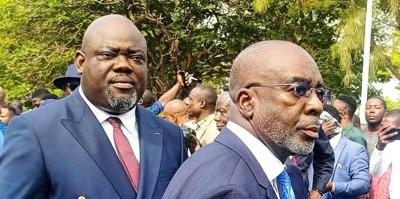In Monrovia, on October 30, 2024, tensions escalated in the House of Representatives as Deputy House Speaker Thomas Fallah sought legal counsel regarding his participation in legislative sessions convened by a bloc of lawmakers aiming to unseat Speaker Koffa. Despite a Supreme Court order halting any proceedings against Koffa, the majority bloc has persisted in its efforts, insisting on holding sessions in the William R. Tolbert Joint Chambers. Fallah, who has so far aligned himself with Koffa’s leadership amid the tumult, faced pressure from the majority bloc, which comprises around 40 members, to join their sessions. They have expressed their intention to execute a vote of no confidence against Koffa, citing unresolved grievances. The challenge lies in the fact that Koffa requires 37 lawmakers present to conduct any legislative business but is currently short by seven votes.
The political crisis has prompted Speaker Koffa to involve the Supreme Court, requesting an intervention regarding the ongoing attempts to remove him from his position. In acknowledging the urgency of the situation, Deputy Speaker Fallah addressed the Acting Chief Clerk James Toubie in a letter, revealing his intention to consult with his legal team on the implications of attending a session called by the majority bloc. His political maneuvering highlights the complexity of the situation, as he seeks to navigate the precarious balance between maintaining loyalty to Koffa and adhering to legal counsel. The majority bloc’s persistent advocacy for Koffa’s removal underscores the fractures within the House, fueling further political division.
While Fallah reached out to his colleagues to excuse his absence for legal consultations, the majority bloc’s Representative Dorwohn Gleekia emphasized the necessity of Fallah’s presence in advancing their agenda. He cautioned Fallah to attend an upcoming session by Thursday, hinting at potential repercussions if he failed to comply. This underscores the high stakes involved in the ongoing struggle for leadership control within the House and the importance placed on legislative procedure by the rebellious faction. Gleekia’s insistence on Fallah’s attendance reflects the urgency of efforts to mobilize support against Koffa, which has created an atmosphere of unease.
Amidst the attempts to unseat Koffa, it’s important to note the legal backdrop provided by the Supreme Court’s intervention. The court’s stay order came in response to Koffa’s petition, effectively freezing any actions that might challenge his authority until a scheduled conference before Justice Yamie Quiqui Gbeisay on November 4, 2024. This act highlights the judiciary’s role in mediating political disputes and the necessity for the legislature to respect the bounds of the law during such crises. However, despite the clear instruction from the Supreme Court, the majority bloc maintains that its sessions will continue until the scheduled conference, invoking Article 3 of the Liberian Constitution, which delineates the separation of powers.
The assertion of independence by the majority bloc raises critical questions regarding the interplay between the branches of government and the limits of authority. Representative Michael Thomas articulated their position during a session, emphasizing the sovereignty of Liberia and expressing their intent to continue with legislative activities despite the court’s ruling. This rhetoric not only reflects a commitment to their cause but also places them in opposition to the judicial reinforcement of Koffa’s leadership. The political climate is thus characterized by a duality of power—where one faction seeks to assert its authority through legislative procedure, while another contends with the judicial constraints.
Overall, the ongoing political standoff in the Liberian House of Representatives encapsulates the challenges of governance during periods of crisis. The actions of Deputy Speaker Fallah reveal the intricate maneuvering necessary in such contentious times, as lawmakers grapple with challenges to their leadership under the legal framework governing their functions. The refusal of the majority bloc to acquiesce to the Supreme Court’s stay order signals a determination to fight for what they view as legitimate grievances against Koffa’s tenure. The unfolding drama holds significant implications for the future of legislative processes and political stability in Liberia, as the resolution to this impasse is unlikely to emerge without further legal and political ramifications.


